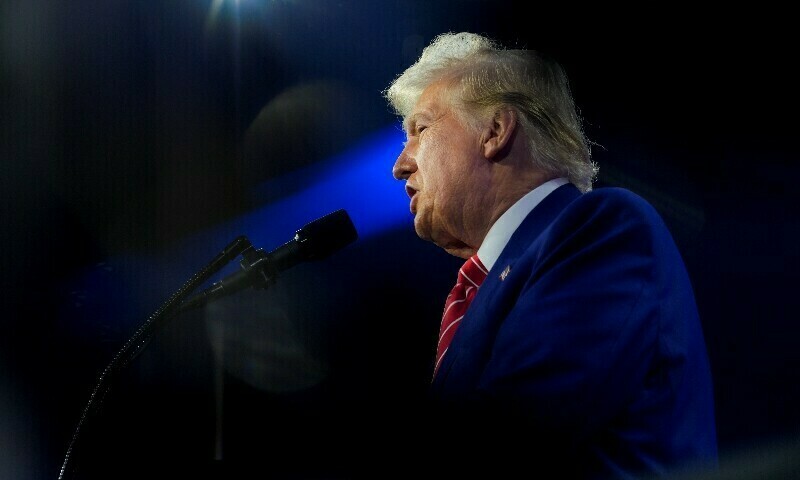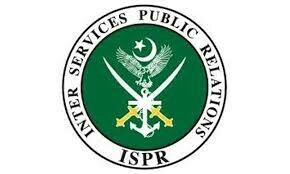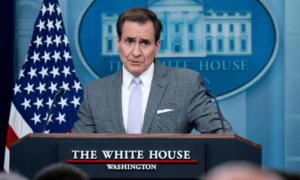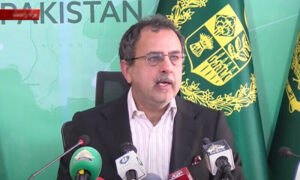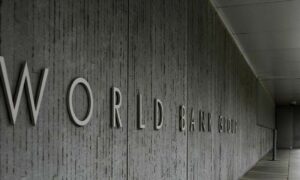US-Pakistan relations face renewed scrutiny amidst Islamabad’s internal political turmoil, and a shifting global landscape.
• Ambassador Rizwan Sheikh’s schedule filled to brim with ‘meetings on the Hill’
• PTI-allied diaspora groups set to hold Congressional briefing on 22nd
WITH Donald Trump set to begin his second term in the White House, Pakistan’s political and diplomatic machinery in the United States is ramping up efforts to engage with the new Congress and recalibrate its approach to Washington’s shifting dynamics.
With the new Congress sworn in last week and set to resume routine proceedings after Trump’s inauguration on Jan 20, both the Pakistan embassy and supporters of Imran Khan’s PTI are gearing up for strategic lobbying.
These efforts come at a critical juncture, as US-Pakistan relations face renewed scrutiny amidst Islamabad’s internal political turmoil, and a shifting global landscape.
Pakistan’s Ambassador to the United States, Rizwan Saeed Sheikh, returned to Washington on Monday after a 20-day visit to Islamabad, during which he attended consultations and a conference of key Pakistani envoys.
According to embassy officials, the ambassador has already met more than 20 US lawmakers since the November midterm elections and is set to resume these engagements promptly.
“We aim to promote Pakistan and its interests,” an embassy official said, emphasising that their outreach is not tied to any particular political group.
Ambassador Sheikh, however, maintained a neutral stance when asked about PTI’s efforts to lobby Congress, noting, “We respect differences of opinion, but individual views should not negatively influence relations between our two countries.”
He further urged the Pakistani diaspora to prioritise US-Pakistan relations over domestic politics, stating, “Internal politics should not be allowed to impact Pakistan’s relations with other nations. While we cannot control individual actions, we can appeal to them to act as responsible promoters of the US-Pakistan partnership.”
PTI advocacy
On the other hand, PTI supporters in the US are taking a more confrontational approach. Dr Usman Malik, associated with First Pakistan Global (FPG) and the Pakistani American Physicians Association (PAPA), announced a Congressional briefing scheduled for Jan 22, just two days after Trump’s swearing-in ceremony. According to Dr Malik, 15 lawmakers from the Republican and Democratic parties have confirmed their attendance.
While FPG and PAPA claim their focus is on accountability and democratic norms, Dr Malik acknowledged their partisan tilt. “We would have liked to campaign for Pakistan with the embassy if we had a proper democratic and justice system,” he said. “We are forced to lobby for Imran Khan and his party, because there is no justice in Pakistan.”
The upcoming briefing will reportedly highlight human rights violations and the political crisis in Pakistan. FPG has framed these efforts as ensuring that “the voices of the oppressed are heard loud and clear,” pointing to alleged atrocities by the Pakistani government.
The intensified advocacy by groups like FPG and PAPA reflects a growing trend among the diaspora to challenge Pakistan’s political status quo. These groups have garnered attention for raising concerns over military trials of civilians and the erosion of democratic norms. FPG has also announced plans to invoke the Global Magnitsky Act to seek sanctions against individuals accused of human rights abuses.
Prominent Republican figures such as Richard Grenell and Zalmay Khalilzad have lent their voices to these causes. The latter recently urged stronger US measures, stating, “It is time to put more pressure on Pakistan, especially the military, to facilitate a balanced political agreement with PTI and the release of Imran Khan”.
US response
Despite the Biden administration’s criticism of military trials for civilians and other anti-democratic measures in Pakistan, experts remain skeptical about the potential for major policy shifts under Trump.
Joshua White of Johns Hopkins University remarked, “The Biden administration has mustered two parting criticisms of the Pakistani military—one on missile developments and the other on the treatment of PTI. Both reflect long-standing frustrations and bilateral friction.”
Michael Kugelman, a senior associate at the Wilson Centre, elaborated, “The US has said relatively little publicly about Khan’s plight and Pakistani politics more broadly, in part to avoid getting dragged into Pakistan’s messy political environment.”
While the Biden administration’s critiques of Pakistan’s democratic backsliding, including military trials, have resonated, a broader policy shift under Trump appears unlikely. Kugelman noted that actions like military trials and the potential ban on PTI have crossed Washington’s red lines, prompting statements from the US State Department.
The road ahead
The interplay of advocacy, diplomacy, and US strategic interests underscores the complex dynamics shaping the months ahead.
Analysts believe Trump’s initial focus will likely lie elsewhere, limiting immediate attention to Pakistan. However, Hassan Abbas, a professor at the US National Defense University, noted that symbolic gestures, such as a statement or tweet from Trump, could still materialise. “A tweet or a statement during a press conference could urge due process for Khan,” he said.
Shuja Nawaz, a distinguished fellow at the Atlantic Council, emphasised the importance of leveraging Republican support. “Getting the ear and voice of Richard Grenell, a key Trump insider, was crucial,” he explained, underscoring the potential for targeted lobbying to influence policy narratives.
Published in Dawn, January 15th, 2025
- Desk Reporthttps://foresightmags.com/author/admin/
- Desk Reporthttps://foresightmags.com/author/admin/
- Desk Reporthttps://foresightmags.com/author/admin/
- Desk Reporthttps://foresightmags.com/author/admin/

